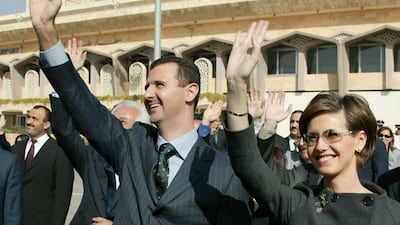Live updates: Follow the latest on Syria
A week after Bashar Al Assad fled Syria, bringing down the curtain on a 54-year family dynasty, the extent to which his regime's oppressive rule used brutality quickly emerged.
From Aleppo in the north, Homs and Hama in the centre and the capital Damascus farther south, the gates of the regime's notorious prisons have been flung open, allowing tens of thousands of inmates to walk free after languishing there for years, maybe decades, enduring torture and without legal representation or basic care.
Some were on death row, ecstatic to have escaped the gallows; others mentally scarred by their deep trauma. Most, however, were overwhelmed by their unexpected freedom, hysterically celebrating with their families and loved ones in scenes that showed both their joyous disbelief and the depth of their suffering.
It is all a far cry from the day 24 years ago when Mr Al Assad, who is now 59 and living with his wife and three children in exile in Russia, offered thousands in Damascus a glimpse of the man who was on the cusp of taking the reins of power in their ancient nation.
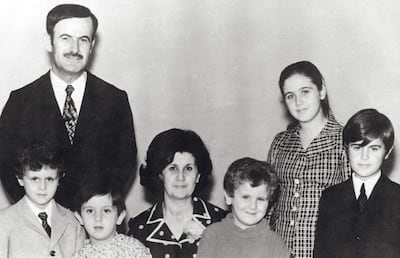
Idolised for his youth and celebrated as a London-trained ophthalmologist, Mr Al Assad was just 34 in June 2000 when the death of his ailing father – Syria's president of nearly 30 years, Hafez Al Assad – gave him the land's highest job.
The younger Al Assad had been summoned back from London six years earlier to become his father's heir-apparent after the death of his older brother Bassel in a car crash in Damascus.
"He did not have a vision to develop and modernise all of Syria," said Ayman Abdel Nour, a US-based Syrian analyst who advised Mr Al Assad on reform in the early years of his rule. "But he had a clear vision to empower and enrich his capitalist cronies and that's why 90 per cent of Syrians rose against him.
"Publicly, he spoke of fighting corruption, improving the economy, supporting students and the free flow of information. He did not deliver and at the end his external supporters abandoned him."
Giving up his medical career, Mr Al Assad, whose 24-year authoritarian rule was toppled on December 8, began his training in the military academy, and by the time his father died he held the rank of a colonel.
As a man assured to be the nation's next leader, Mr Al Assad made a dramatic appearance in Damascus's central Umayyad Square the day of his father's funeral.
He acknowledged the crowd’s enthusiastic chants of support with a wave punctuated by a clenched fist, a powerful gesture that resonated with the gathered masses.
By then, Mr Al Assad's ascent to the presidency had already been meticulously orchestrated. A compliant parliament swiftly amended the constitution, lowering the minimum age for the presidency from 40 to 34.
Meanwhile, the armed forces played their part, promoting him from colonel to full general to qualify him as supreme commander in chief.
For many Syrians, these developments showed troubling continuity of the authoritarian rule of his father. Yet, in the weeks that followed, hopes for reform emerged. A period of cautious optimism, later called the “Damascus Spring", briefly reignited aspirations for a more open and tolerant government.
Academics, opposition politicians, artists and men of letters were allowed for the first time since Hafez Al Assad seized power in 1970 to fearlessly and publicly debate the future and ills of their nation. They explored avenues to establish a democratic Syria; guaranteeing rights, inclusion and economic reforms.
The debates, mostly moderated by some of Damascus's most prominent political luminaries, attracted ordinary Syrians and were widely covered by the media.
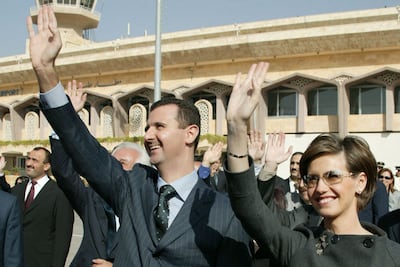
Even Bashar Al Assad's marriage later in 2000 to Asma, a British-Syrian he met in London where she grew up and worked at an investment bank, fuelled the hopes of many Syrians desperate to see the end of the dark days of oppression. That did not last.
Mr Al Assad, who fled Damascus to Moscow late on December 7 before opposition forces captured Damascus, moved to outlaw those debates after a public petition signed by 1,000 pro-democracy figures in 2001 that called for more freedom and a multi-party political system.
The key leaders of the reform movement were thrown into jail, including advocates of non-violence in their sixties and seventies. Others were warned to stop their activism but many more voluntarily fell silent, knowing what could await them.
The official narrative for the crackdown was a familiar one: those behind the Damascus Spring were undermining the security and stability of the nation and demoralising its citizens.

Bashar Al Assad's handling of dissent was not very different from his father's. But the younger Mr Al Assad continued for a decade to enjoy the embrace of many in the West, thanks to a public relations campaign that projected him as modern and reformist, despite growing evidence of a repressive regime at home.
Western-style democracy, he often repeated, was not suited for Syria. But he embraced a degree of economic reform, championing a free market ideology and opening up the economy. In the end, that only benefited members of his own family and coterie of regime cronies.
Hafez Al Assad was hailed as a champion of the poor and downtrodden when he seized power in a 1970 coup he called a “corrective” movement. Syrians later discovered he had different plans for them, showing no tolerance for any dissent, and his army and security agencies killed thousands in the city of Hama in 1982 to suppress a challenge to his rule.
Bashar Al Assad proved to be no less brutal than his father, a choice that may have significantly contributed to the swift fall of his regime last weekend and the relief felt by millions that the autocratic family dynasty has been toppled.
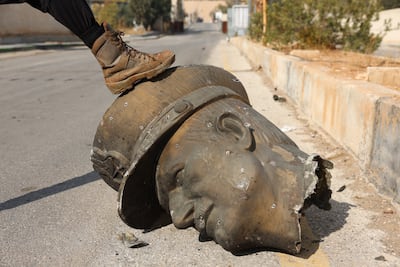
This was manifested in his handling of the 2011 uprising against his rule that soon turned into a civil war that displaced half the population and killed hundreds of thousands, while devastating the nation.
Alongside his crackdowns came lengthy, convoluted speeches in which he sought to justify his actions while denying any wrongdoing and calling the opposition terrorists.
"We don't kill civilians, because we don't have the moral incentive, we don't have the interest to kill civilians," Mr Al Assad said in a TV interview in 2016, a year after Russia intervened in the war, allowing him to regain much of the territory he lost to the opposition.
"It's our people who support us. If you want to kill the Syrian people, who is going to support us as a government, as officials? No one. Of course, whenever you have a war, the civilians and innocents will pay the price. That's in any war, any war is a bad war. There is no good war," he said when asked about civilian casualties.
He also consistently avoided addressing the allegations of massive corruption involving his immediate family, close relatives, and a circle of favoured businessmen. His silence only fuelled Damascus's rumour mill, bolstered the growing ranks of the opposition and deepened the discontent of Syrians, including those who did not support the opposition.
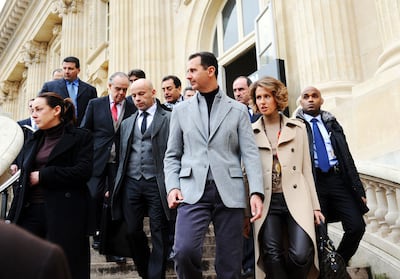
Even his wife Asma, who dazzled Syrians for years with her immaculate fashion sense and patronage of charities and the arts, was not spared from the rumours of corruption.
That mindset of Mr Al Assad did not change in 13 years of civil war and led him to believe that his regime had won the war – thanks to the help of allies Russia, Iran and Lebanon's Hezbollah – and that the relative quiet that had prevailed since 2020 would last.
That perception could have only been strengthened by Syria's return to the Arab fold last year, when Mr Al Assad was invited to attend an Arab League summit for the first time in more than a decade. Some western nations, mistakenly believing his rule was secure, even began warming up to him.
"The regime in Damascus is to blame for its current existential crisis. It did not benefit from the favourable circumstances made possible following the suppression of the rebellion against him by Russia and Iran," prominent Egyptian analyst Ibrahim Mouawad wrote in the Cairo daily Al Shorouk a day before the fall of Damascus.
"He should have tried to strike give-and-take deals with the different opposition groups to broaden the base on which he stood, but the regime selected to do nothing rather than engage in politics."
Mr Al Assad's downfall, however, may have more to do with his calamitous miscalculations, and state of perpetual denial, than the fact that his external backers were not in a position to help him cling to power.
"He made a very stark choice on the uprising when he decided to deal with it as an existential threat," said Michael Hanna, director of the US programme in the International Crisis Group. "Now that he's gone, he leaves behind a bloody legacy of repression and failure."
